- Home
- Jerold Last
Unbearably Deadly (Roger and Suzanne South American Mystery Series Book 9) Page 2
Unbearably Deadly (Roger and Suzanne South American Mystery Series Book 9) Read online
Page 2
But first it built a fire in the conveniently located fire pit, removed the coat, shoe protectors, gloves, and cap, which had been splattered with blood during the killing spree, and threw the bloody clothing into the fire. “So much for forensic evidence,” thought “The Bear”. “Now it’s time to go.”
“The Bear” had protected its den. Now it was time to go. It picked up the clubs, claws, and dart rifle, leaving the clearing, two bicycles, and two dead bodies behind.
Chapter1. Our newest case comes calling
It was a beautiful southern California day in the final week of June. The sky was cloudless and mostly blue, with little or no smog here in the far west of Los Angeles. The winds of the previous days had blown most of the gunk east to go-away land. Today was warm, not hot, the sun was shining brightly, and a gentle breeze blew in from the ocean. My wife, Suzanne, our son, Robert, and his nanny, Bruce, had just returned with me from the Galapagos Islands, where we investigated a series of murders on our cruise ship. I’m Roger Bowman, 6 foot, two inches, 190 pounds, 36 years old, brown hair, blue eyes, and a Gemini. A native Californian, I was born and raised in San Diego, and currently work out of an office in Century City as a private detective.
After graduation from college I went to law school at UCLA, graduated, and joined a large firm that paid a large salary to me as a patent attorney. This legal career, though highly lucrative, was too boring for me, so I’d quit to become first a street cop, then a homicide detective on the Los Angeles police force. I didn’t do too well in such a regimented bureaucracy, so retired at the peak of my second career as a cop. After quitting the police force I became a private investigator, a job where I can be my own boss and not part of a mind crushing bureaucracy. Thus far, things seem to be working out very well with my third career as a P.I. My wife Suzanne is a Professor of Biochemistry at UCLA. Our live-in nanny Bruce, who looks after 12-month-old Robert, keeps house and cooks for us.
My potential client with the 3 PM appointment showed up right on time. Middle aged, small, thin, balding, wearing thick eyeglasses, he seemed almost timid. The would-be client explained what he needed in about two minutes. His name was Howard something-or-other and he was looking for a long-term bodyguard. I sent him on to see my partner Vincent Romero, the former CIA agent and chemistry professor I had recruited from Northern Chile, who managed that half of our agency. A short while later Howard something-or-other was saying good-bye on his way out the door and Vincent was looking glumly at me.
“Did we just get a new client?” I asked.
“Yeah, he’ll try us out for a month under contract. That translates to my guarding his body half a day or so about half a dozen times while he picks up and delivers some expensive jewelry to selected clients. If everything works out OK, he’ll sign a long-term contract and we’ll make a great deal of money from him.”
"What's the problem, then?" I asked Vincent. “You don’t look happy.”
I looked at him closely. He’s in his mid- or upper-50s and in excellent shape for his age with a permanent tan from his many years of living as an undercover CIA agent in Northern Chile’s Atacama Desert. According to Suzanne and Bruce he’s very, very good looking. At almost 6 feet tall and wide across the shoulders he looks the part of a bodyguard. Since image is often far more important than substance in Hollywood, he has brought a lot of new business into our agency since he joined it. Fortunately, Vincent brings both image and substance to his job as a P.I. He handles all of our agency’s bodyguard work, manages the agency in my absence, and recently became a full partner in what’s now our detective agency.
He paced back and forth like a caged tiger in my small office. "I just got a phone call from a former colleague at the CIA telling me that my closest friends from Iquique, Roberta and Francis Roberts, were killed by a bear in Alaska in a freak incident while they were wilderness biking. You remember them from our trip to Cuzco and Machu Picchu, don't you?"
It was easy to come up with the memory. "Of course I do. We sat together on the flight to Cuzco and on the train ride to Machu Picchu. They seemed to be very nice people. Do you know what happened to them?"
He continued pacing back and forth while looking at me glumly. “The official story is they were trail biking on their own during a vacation in Denali National Park, up north of Anchorage, when they were attacked by a bear and killed. It’s hard for me to believe anything the size of a Grizzly Bear could get close enough to Francis to do any real damage without his knowing it was there. With all of his CIA training, he could have disabled a bear in a fight, or even killed it if he had a knife or a hatchet. And he never went anywhere without a very special knife in his pocket for just such contingencies until the TSA rules banned pocketknives on airplanes. My instincts tell me something’s wrong with the official version of what happened.”
“Would you like to take a few days off to go up there and scope it out, Vincent?”
He stopped pacing for a minute or two of deep thought. “No, I don’t think so. It would just bring back memories for me and make it hurt more. What I’d really like is for you and Suzanne to take a vacation in Alaska to see the Denali wilderness and look for whatever you can find out about Francis and Roberta’s killings. You’re both much better detectives than I am. From the sound of things so far, this could turn out to be a bizarre mystery, which is your forte, not mine.”
I thought about it for a bit before answering. “There’s a certain charm to the idea. It would be quite a change for Suzanne and me. There really isn’t anywhere we could go in this hemisphere that’s further away from South America than Alaska, and that would make a most welcome change from our last few vacations. Let me bounce the idea off Suzanne. If she says yes, I think I’d enjoy the trip even if it’s for all the wrong reasons.”
“I’ll be the client on this case, Roger. Make sure the agency bills me for your time.”
“You’ve got to be kidding, Vincent. We’re partners, and your friends were important to you. This is just a vacation for Suzanne and me—no bills and no formal reports, but we’ll do whatever we can to find out what actually happened.”
Vincent came back to my office later that day, handing me an open envelope containing a folded slip of paper. “Here’s the name of a guy I know in Anchorage, Alaska who used to have CIA connections, and maybe still does. If you need any CIA type information that would be hard to find through your usual channels, try calling George. You can tell him we’re partners and I gave you his name as an introduction. He’s ‘off the books’, as they say, so don’t share this with anyone else there.”
I tucked the folded paper with George’s contact information into my wallet. Maybe it would come in handy; it couldn’t hurt to have an edge up in Alaska if we needed it.
That night over dinner I broached the topic of a quickie working vacation in Alaska to my wife, Suzanne. She was completely back into shape after giving birth to Robert a year ago. About 5’8”, in her early 30s with a lean athletic body, beautiful face, long blond hair, and an aura of elegance and good breeding, she was worthy of a long look or two. “Do you remember Roberta and Francis Roberts from Iquique? We met them when we traveled to Machu Picchu.”
Suzanne thought for a bit. “Sure I do. They were the couple we sat next to when we flew to Cuzco. Nice people. Why are you asking?”
“They were killed in what the authorities are calling a random attack by a bear in the wilderness in the middle of Alaska. Vincent asked me if we could go up there to investigate what happened. He’s convinced that no normal bear could have won a fight with Francis, much less with both of them.”
There was a short silence. “I’ve always wanted to visit Alaska, and I really liked the Roberts when we met them. I don’t have any classes to teach for the next couple of weeks. Count me in.”
Also over dinner that night Bruce agreed to take care of Robert while we were visiting Alaska. Robert at 1 year old was napping less and demanding a lot more attention than he had during his first si
x months of life. I guessed we might have to be in Alaska for a week or two, which would be a long break for Suzanne from her work at UCLA and a lot of baby care for Bruce. Both of them knew and liked Vincent. Nobody mentioned the inconvenience. Nor did Bruce mention the extra dog care he’d have to do.
Bruce fits the Hollywood stereotype of a flamboyant, flaming gay male perfectly, perhaps because that's exactly what he is. He’s from West Hollywood, slim and wiry, has dark hair with a cowlick, and is 28-ish, good looking, with an infectious smile. He likes working as a live-in Nanny, a job with excellent pay, easy work in the physical sense, and free travel if you pick the right family. Bruce was great with Robert and was available 24/7 if needed. Before he became a nanny, he served twice as a Navy SEAL in combat zones, once in Iraq and once in Afghanistan, so is a very good choice to have along in tough situations. In fact, he’s played a major role helping me in several of our previous cases, including our most recent investigation of several killings in the Galapagos Islands, and moonlights as a bodyguard with Vincent as time permits.
Training and exercising our dogs Juliet and her puppy son Romeo would add to Bruce’s chores in our absence, but for him that was more fun than work. The puppy had grown enough in the past five months to enjoy playing in the backyard with his mother, so exercising him required less human supervision than it had during his first three months. But German Shorthaired Pointers need a lot more exercise than they can get in our backyard, so taking them to a park where they could run a few miles off leash every now and then does wonders for encouraging them to relax around the house.
Bruce was working on training Romeo to point birds and to retrieve objects to him on command. Romeo was just about ready to compete for his Junior Hunter title, which tests a bird dog’s ability to find and point birds in hunt tests. They aren’t expected to retrieve until the next level of hunt test, the Senior Hunter. But Bruce liked to make a game out of the puppy’s training routine whenever he could, and fetching the bumper he threw in the back yard was one of the most popular games he played with Romeo.
“Hey, Bruce,” I called to him. “Why do they call those things ‘bumpers’?
“Because they look like ‘bumpers’ they use on boats to protect them from damage when they bang into a dock they’re tied to. The old time fishermen used their retrievers to fetch the bumpers when they fell out of the boats because the bumpers were so hard to catch up to when all you had were oars to row over to them wherever they floated to in the ocean. For all I know, duck hunters still use their retrievers to do this job as well as retrieving ducks and geese.”
I watched the dog training for a few more minutes. The whole process fascinated me. It was too bad Suzanne and I had to be on an airplane tomorrow morning headed for Alaska with open return tickets. It looked like we’d have to put off spending quality time with Robert and the dogs for a little while longer.
Chapter2. Anchorage
We flew from Los Angeles to Anchorage, with a stopover in Seattle to switch planes. The trip took us almost 8 hours. With the 1-hour difference in time zones, we were there at 3-something PM local time, two minutes before our scheduled arrival. A taxi took us to a hotel with a familiar chain affiliation near the airport where we’d reserved a room for the night. It took less than ten minutes to check in, put our suitcases in our room, and walk a half block over to check out a bar and restaurant recommended by the room clerk at the hotel as a good place to eat dinner. With darkness this far north coming after 10 PM in late June, we still had hours of light outside and plenty of time to explore Anchorage before we had to worry about eating dinner.
On impulse, I checked a phone book at the bar to find the address for the FBI offices here in town. The location turned out to be only a few blocks from the restaurant we’d selected for dinner, so I suggested we walk over and visit them. Walking along the streets between restaurant and office building, we started to get a feeling for Anchorage. The sky was foreboding by Southern California standards, with gray clouds obscuring the sun and drizzly cold air embracing us on the ground. The temperature was in the 50s, but the combination of wind and humidity made it feel cold and damp. The streets were relatively deserted, with people working indoors at this hour so there weren’t any crowds to be seen.
Buildings, even the old, run-down storefronts and apparently abandoned industrial structures, were built of brick and concrete and constructed solidly. Windows were boarded up on the empty buildings, a reminder we were visiting an active earthquake zone and harsh winters were the norm.
Lights were visible from the street in the clean and modern high-rise building containing the FBI offices, so we went inside and checked the directory posted on the wall of the empty lobby. The office suite for the Bureau was listed on the third floor, which we headed to in one of the building’s twin elevators.
A full house of suited drones were working in a small suite of offices with partially closed doors on one side of the front desk. A receptionist sat in front of the suite at the desk, which stretched all the way to the far wall. Two men in suits we assumed were FBI agents looked busy shuffling paperwork as they sat directly behind the receptionist at small desks in offices with wide-open doors. On the other side of the desk were a couple of large windows in the outside wall overlooking the street, a coffee machine, and seemingly endless rows of filing cabinets. Suzanne introduced herself to the receptionist. “Is there an agent here we can ask about a recent death in the National Park, please?”
The receptionist didn’t let us past her desk. She called over to one of the suits in the two offices behind her. “Ed, can you give us a bit of help here, please?”
Ed walked over. He was about 5 foot 9 inches tall, in his high 40s, freshly cut and trimmed dark brown hair with a receding hairline, dark brown eyes, and a permanent frown. The receptionist introduced him to us as the lead agent in the office and explained to him why we were here. An ID card attached to his suit jacket pocket told us that Ed was a Special Agent in the FBI and that his parents had named him Edward Barclay.
“Are either of you directly related to the victims?” he asked abruptly.
“No, neither of us is a relative, but they were old friends,” answered Suzanne politely.
Ed, clearly a charm school dropout, snarled, “We don’t discuss active cases.” He turned rudely on his heel and went back to his office. We took the not so subtle hint and left the FBI office.
Someone came up behind us as we left the building. I recognized the other FBI agent from the office adjacent to Ed’s, who introduced himself, flashed a badge, and asked if he could walk with us for a bit. His parents had named him Jason Culpepper according to his ID card. He was about 6 feet tall, mid-30s, blond hair cut short in the traditional military style, and looked like he smiled every now and then.
He cleared his throat and began speaking in a low and measured tone of voice. “I want to apologize for my partner. His social skills leave something to be desired. We’ve got some ranking agents visiting us from down south in the lower 48 where our bosses are stationed, and Ed’s a bit stressed out. Normally, Alaskans try to be a lot more hospitable. Can I offer you a quick tour of the city and maybe even answer a few of your questions?”
“Sounds good to me. Thanks. I’m Roger Bowman and this is my wife, Suzanne.” I answered. “May I ask if you always try to make amends for old Ed’s rudeness or whether we’re getting special treatment here?”
The FBI agent chuckled. “No, I don’t usually do this. If I did, it wouldn’t leave me any time to do my job. You’re getting the VIP treatment because I noticed that neither of you seemed to be nervous when you came into the office. Folks who visit the FBI are usually nervous and upset. That lack of nerves can mean a lot of different things, some good and some bad. I thought it might be a good idea to check you out and decide which it was in your case. This seemed to be the quickest and easiest way to find out.”
We all stopped in front of a standard issue black SUV with Federal government lice
nse plates. Agent Culpepper gestured me to the front passenger seat and Suzanne to the rear seat before getting in himself and starting the motor. He drove carefully, hands at the 10-2 position on the steering wheel, eyes looking carefully at the road in front of our vehicle. “Keep your eyes open; driving around in Anchorage can be an adventure because of the wildlife. The official guess is about 300 bears live in and around the city, and they aren’t bashful about crossing the roads. You don’t want to hit one for a lot of reasons, not the least of which is an angry bear is more than a match for a car or van.
“Another problem is the moose. The best guess for our local moose population is about a thousand live in Anchorage during the winter, where food appears magically in garbage cans and hungry animals can find dinner even when there’s snow on the ground. We average about 100 moose a year killed by cars on the streets and roads around town here. If a moose sees you walking around and decides it doesn’t like you, they’ll get aggressive and charge right at you. The Fish and Game department has to kill a few of the more aggressive moose every year just to keep our local pedestrians alive.”
“You make it sound like a large, open-air zoo,” Suzanne commented.

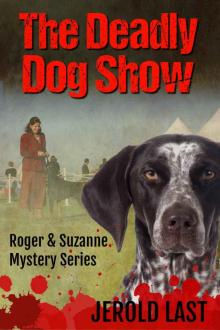 The Deadly Dog Show (Roger and Suzanne South American Mystery Series Book 6)
The Deadly Dog Show (Roger and Suzanne South American Mystery Series Book 6) The Surreal Killer (Roger and Suzanne South American Mystery Series Book 2)
The Surreal Killer (Roger and Suzanne South American Mystery Series Book 2) The Body in the Bed (Roger and Suzanne South American Mystery Series Book 5)
The Body in the Bed (Roger and Suzanne South American Mystery Series Book 5)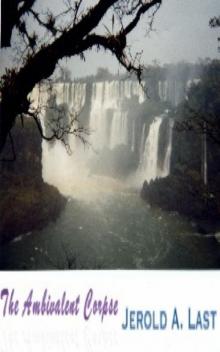 The Ambivalent Corpse (Roger and Suzanne South American Mystery Series Book 1)
The Ambivalent Corpse (Roger and Suzanne South American Mystery Series Book 1)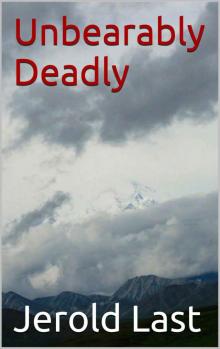 Unbearably Deadly (Roger and Suzanne South American Mystery Series Book 9)
Unbearably Deadly (Roger and Suzanne South American Mystery Series Book 9)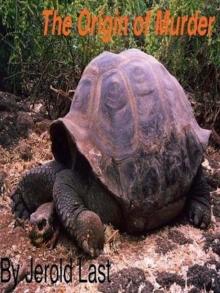 The Origin Of Murder (Roger and Suzanne South American Mystery Series Book 8)
The Origin Of Murder (Roger and Suzanne South American Mystery Series Book 8)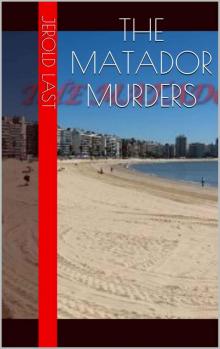 The Matador Murders (Roger and Suzanne South American Mystery Series Book 4)
The Matador Murders (Roger and Suzanne South American Mystery Series Book 4)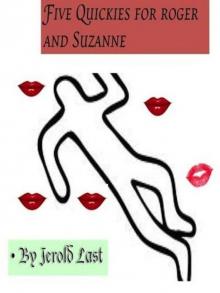 Five Quickies For Roger And Suzanne (Roger and Suzanne South American Mystery Series Book 7)
Five Quickies For Roger And Suzanne (Roger and Suzanne South American Mystery Series Book 7)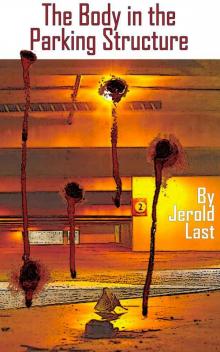 The Body in the Parking Structure (Roger and Suzanne South American Mystery Series Book 4)
The Body in the Parking Structure (Roger and Suzanne South American Mystery Series Book 4)